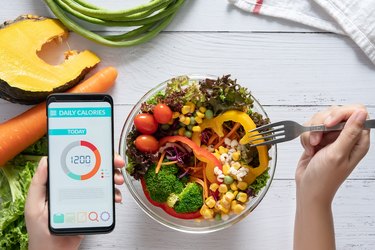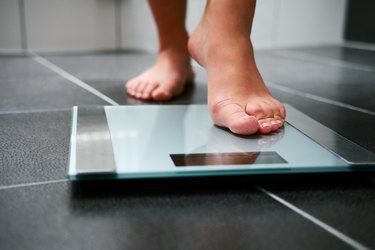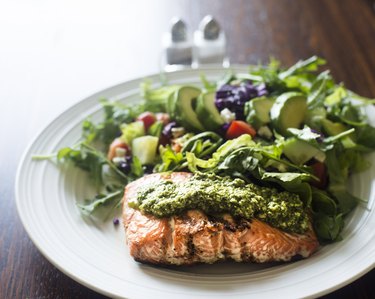Example of a 1000 Calorie Per Day Diet

Any diet that has you eating fewer than 1,200 calories is a very-low-calorie diet and carries risks for your weight and health.
Image Credit: asiandelight/iStock/GettyImages
Want to lose a lot of weight — and fast? You might be tempted to drastically slash your calorie intake. But going too low isn't good for your body, and it can actually backfire.
Calories, of course, are the energy we get from food. Your body needs them to function, but taking in too many can ultimately cause your weight to go up. Cutting back, on the other hand, is a key step toward bringing your weight down. When you take in fewer calories than your body needs for energy, it's forced to make up the difference by burning stored fat. Over time, that adds up to pounds lost, according to the Mayo Clinic.
There's a sweet spot, though. While a moderate amount of calories can lead to healthy, sustainable weight loss, very-low-calorie diets can leave you feeling lousy and put your health at risk. And they're not the best at helping you lose weight long-term, either.
So how low is too low, and what can happen when you dip below that threshold? Here's a look at the downsides of extreme low-calorie diets, plus how to lose weight in a lasting way that feels good.
What's Considered a Low-Calorie Diet?
It's generally recommended that people assigned female at birth avoid eating fewer than 1,200 calories per day and people assigned male at birth avoid eating fewer than 1,500 calories per day when trying to lose weight, according to Harvard Health Publishing. Getting at least that many calories helps reduce the chances for a nutritional deficiency and potential health problems that can come from eating too little.
Experts like Lisa Young, PhD, RDN, author of Finally Full, Finally Slim and adjunct professor of nutrition at New York University, agree. "I advise that people not eat fewer than 1,200 calories," she says.
That said, there are some cases where it could make sense to eat less. Very-low-calorie diets, or what weight-loss experts call VLC diets or VLCDs, for short, involve eating fewer than 800 calories per day, according to the National Institutes of Health (NIH). Usually, they're only meant for people with a very high body mass index who are experiencing a weight-loss plateau (meaning their weight loss has stalled).
VLCDs are often liquid diets that are designed by experts to deliver maximal nutrition for minimal calories. They're only meant to be used for short periods, and they need to be medically supervised to make sure they're done safely, the NIH says. You shouldn't try a very-low-calorie diet without talking to your doctor first.
Do Low-Calorie Diets Work for Weight Loss?

Just because a diet helps you lose weight doesn't mean it's healthy.
Image Credit: Rostislav_Sedlacek/iStock/GettyImages
Even though experts generally recommend steering clear of diets that dip below 1,200 calories, there are still plenty of plans that encourage eating less. Diets like the Optifast diet, cabbage soup diet, low-calorie keto diet or 1,000-calorie diet plans you find online might promise big results fast.
But eating plans that recommend eating fewer than 1,200 calories per day tend to fall into crash diet territory. In other words, they might help you lose some weight in the short term, but they're not sustainable.
"Food is fuel and gives you energy," Young explains. "When you eat too little, you are hungry and tired and don't have the energy to do your required tasks."
In fact, people who crash-diet tend to have a harder time maintaining their weight loss in the long term, according to the National Institute of Diabetes and Digestive and Kidney Diseases (NIDDK). Which, if you think about it, makes a lot of sense. If you're always hungry and tired from not eating enough, chances are you'll eventually ditch the diet and start eating more calories. And when that happens, you could end up regaining the weight you lost.
As for VLCDs? They can help people with severe obesity lose a lot of weight quickly. According to the Encyclopedia of Applied Physiology, following a very-low-calorie diet can help someone with obesity lose up to 25 percent of their body weight within 16 weeks. But again, these massive losses aren't always sustainable, and many people struggle with regaining the weight once the VLCD ends.
9 Health Risks of Low-Calorie Diets
Low-calorie diets aren't just hard to keep up. They can actually get in the way of lasting weight loss and could even lead to serious health problems. These include:
1. Slowed Metabolism
Taking in too few calories can send the body into survival mode, where it actually slows down calorie-burning in an effort to hang onto whatever body fat it can, according to the Academy of Nutrition and Dietetics (AND).
That can actually make it harder to lose weight — and over time, it even puts you at risk for gaining weight, Young says. "If someone continues to follow low-calorie or restrictive diets, it gets worse, and your metabolism can remain sluggish," she says.
2. Fatigue and Dizziness
The body uses calories from food for energy to carry out basic functions, from breathing to digesting food to pumping blood, the AND says. So if you're consistently taking in much less than you need, you'll likely start to feel a little weak or worn out.
You might find yourself feeling dizzy or lightheaded, too, because not eating enough can lead to dehydration and low blood sugar.
3. Low Energy for Exercise
If your body barely has enough energy for basic functions, chances are you'll have a hard time making it through a workout. Drastic calorie cuts signal hormonal changes that encourage your body to limit its energy expenditure as much as possible, says nutrition expert Georgie Fear, RD, author of Lean Habits for Lifelong Weight Loss.
Even if you do finish your sweat session, your body will have fought to hold onto as many calories as possible instead of burning them for energy like normal. Slashing your calories too low actually forces your muscles to become more efficient, "which means your movement burns fewer calories than it would if you were in energy balance," Fear explains.
4. Muscle Loss
When the body gets fewer calories than it needs, it makes up the difference by taking extra energy from stored fat (a form of ketosis). The problem? It can take energy from muscle tissue too.
"The hormones that signal your fat cells to break down also work on muscle cells," Fear explains. "Muscle cells also receive the signal to free up energy by breaking down and releasing energy from protein stored within."
Muscle loss isn't good in general, but it's especially bad news if you're trying to lose weight or even maintain a weight loss because muscle burns more calories than fat (aka supports a healthy metabolism).
5. Nutritional Deficiencies
When you take in calories, you're also taking in nutrients like vitamins, minerals and fiber, according to the AND. Cutting your calories very low makes it harder to get all of the nutrients you need, setting the stage for possible deficiencies that could affect your health.
Not getting enough calcium over time, for example, could increase the risk for osteoporosis and hip fractures, according to the AND.
6. Gallstones
Gallstones are hardened bile deposits that form in the gallbladder. They don't always cause symptoms, but they can be painful, and the only way to treat them is to have them removed surgically, according to the Mayo Clinic.
Gallstones are more likely to form when someone loses weight very quickly, like on a low-calorie diet. Experts don't fully understand why, but it seems that rapid weight loss causes changes to the way the body metabolizes fat, which can trigger these stones, according to the Obesity Action Coalition.
7. Nausea
Many of us associate feelings of nausea with overeating, but it can also happen when you don't eat enough. Acid can build up in an empty stomach, which can create a sensation of nausea, according to the International Foundation for Gastrointestinal Disorders.
Nausea's a common side effect of gallstones too. And over time, certain nutrition deficiencies — like too little vitamin B12 — can affect the digestive tract and make you feel nauseated, according to the National Heart, Lung, and Blood Institute (NHLBI).
8. Constipation or Diarrhea
Like nausea, there are a number of reasons why low-calorie diets can cause problems in the poop department. Eating too little fiber or not getting enough liquid can both lead to constipation, according to the Mayo Clinic. And falling short on vitamins like B12 can lead to either constipation or diarrhea, the NHLBI notes.
9. Unsustainable Weight Loss
Most people have a hard time sticking with low-calorie diets for long. Something like a 700-calorie-a-day meal plan, for example, is just too restrictive to keep up with.
"The combination of physical discomfort, having to use a great deal of restraint to resist eating and missing out on favorite foods are costs most people become unwilling to pay sooner or later," Fear says.
And when you ditch the restrictive diet and start taking in more calories, chances are the weight that you lost will pile back on.
How to Calculate Your Calories for Weight Loss
People trying to lose weight should eat about 500 fewer calories per day, according to the Mayo Clinic. (As long as that doesn't put you below the minimum calories mark.) That will add up to about 1 pound lost per week.
The results won't be as fast or dramatic as what you'd get from a crash diet, but the slow-and-steady approach will up your chances for keeping the weight off long term and keeping your health intact while you're at it.
Not sure how many calories you should be eating to lose weight? You can calculate exactly what your body needs by measuring a few key numbers. These include your:
- Resting metabolic rate or RMR, the number of calories your body burns to carry out basic functions when you're completely at rest.
- Total daily energy expenditure or TDEE, the total number of calories your body burns on a given day, including when you're at rest, when you're physically active, or eating or digesting food.
These numbers are based on factors like your height, weight, age and sex, along with your daily activity level. Once you know how many calories you need to maintain your current weight, you can subtract 500 to get your weight-loss calories.
To make things a bit easier, you can use a calorie calculator like LIVESTRONG.com's MyPlate app, which will do the math for you.
Healthy Diets to Try Instead of VLCDs

The Mediterranean diet can help with weight loss and could improve your overall health, too.
Image Credit: Image by Sherry Galey/Moment/GettyImages
The most sustainable diets for successful weight loss include at least 1,200 calories per day, emphasize a variety of nutritious foods and don't make particular foods off-limits.
"It's important to include a balance of carbs, protein and fat, and don't avoid a particular nutrient because it's in style," Young says. (We're looking at you, low-calorie ketogenic diet.)
Fear recommends focusing on small ways to curb your calorie intake that don't leave you feeling deprived. "Think boosting the veggies and reducing the amount of pasta in your favorite dish, or choosing leaner cuts of meat instead of fattier ones," she says. "Being consistent with a small deficit over several months produces more weight loss than a large calorie deficit for a few days here or there."
If you think a specific diet would help you stay on track, consider a plant-heavy eating plan like the Mediterranean diet or the DASH eating plan. Both emphasize fruits and vegetables, whole grains and lean proteins, and encourage you to stick with limited portions of saturated fats and sugar (but neither have to be totally off-limits).
Not only can plans like DASH or the Med diet be satisfying and easier to stick with long-term, they have a proven track record when it comes to better health. According to the NIH, DASH diets combined with exercise can lower blood pressure and help you achieve a healthier weight. And a 2016 review in the The American Journal of Medicine concluded that Mediterranean-style diets are just as effective as more drastic diets for weight loss, helping people lose an average of 22 pounds in a year.
The Bottom Line
Diets under 1,200 calories generally aren't a good option for weight loss: They're hard to stick with, and they can come with health consequences.
You'll lose weight in a healthier way by cutting about 500 calories from your daily diet and aiming to lose 1 pound per week.
If you have obesity and think that a very-low-calorie diet could help you lose weight, talk with your doctor to develop a medically supervised plan that's both nutritionally complete and safe.
Example of a 1000 Calorie Per Day Diet
Source: https://www.livestrong.com/article/13765304-low-calorie-diets/